DI Ray writer Maya Sondhi on her ITV crime drama: ‘I want you to root for Ray and be with her on her journey’
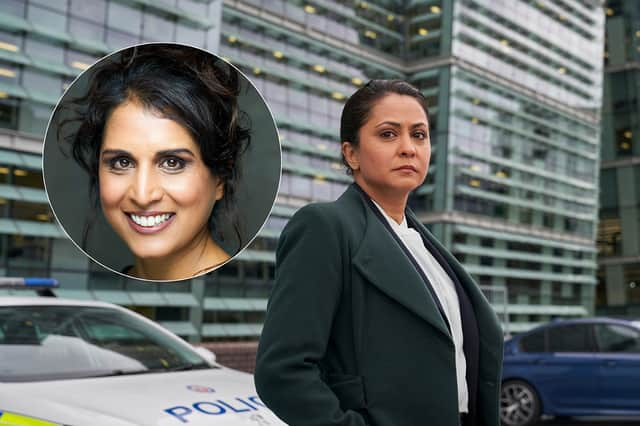

Maya Sondhi is the writer and creator of DI Ray, ITV’s new crime drama. DI Ray follows a newly promoted police officer tasked with solving a “culturally specific homicide” – it’s a murder that proves much more complex than Ray’s colleagues initially believed, and the process of solving it prompts Ray to reflect on her own ongoing identity crisis.
Sondhi – an actor as well as a writer, perhaps best-known for her role in Line of Duty as PC Maneet Bindra – recently joined Alex Moreland to discuss DI Ray. She explained how the series was first developed, from early conversations with Jed Mercurio through to the production process, as well as detailing her influences for the series – both in terms of what she wanted to imitate, and what she wanted DI Ray to stand apart from.
Advertisement
Hide AdAdvertisement
Hide AdSo, we’re speaking on Thursday, and the show is going out in a few days on Monday. How are you feeling at this point?
Well, I’ll be honest, I didn’t sleep a wink last night [laughs]! I’m suddenly getting a bit nervous about it. I kind of forgot about it for a bit – you know, we’re busy working on it and doing post and everything for ages, and then I’ve been busy starting my next project, learning lines. Then yesterday, I was like, Oh, my goodness, on Monday, we’re releasing it to the rest of the world. It’s a kind of nervous excitement.
I can’t even really imagine what it must be like.
It’s like basically… you know if you’ve been pregnant, and then you’re fine with being pregnant, and that’s all fine because the baby’s in, and then you have like a massive freakout: “when it comes out, I don’t think I know actually what I’m supposed to do with it?”
You know, I haven’t actually –
[Laughs]
- but I understand the analogy I think. I assume at this point, a couple of days out, your work on the show is mostly done? You’re not still doing any last-minute tweaks or anything?
Advertisement
Hide AdAdvertisement
Hide AdOh, gosh, no, no. Right up until actually just only a few weeks ago, last week or the week before, we were still doing post-production stuff on the later episodes. Episodes one and two, they’ve been ready for a while now. Genuinely, now I just feel like I want to share it.
In telly terms, it was quite a fast turnaround from the commission day – my daughter’s gonna be two next week, and she was born on the day that we got the script commission for the first episode. From then on, two years I think is actually quite a short [turnaround].
It feels like it’s been really intense, which was really mad for that two years – and obviously doing it in lockdown, filming through COVID times and things like that. So that’s been quite stressful, because at any moment you think, Oh, my goodness, if somebody goes down, then we’re going to lose loads of time. And what if Parminder does, because she’s in every scene? She was so brilliant though, she kept herself so safe and she was so careful. We were very careful. And thankfully, we got through a 10-week shoot without too many mishaps.
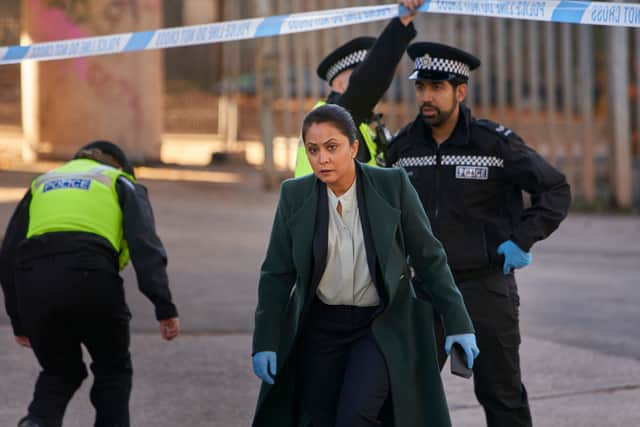

So, building on that, what was your starting point with DI Ray, where did this all begin?
Advertisement
Hide AdAdvertisement
Hide AdJed and I, we’d talked about what I wanted to write, and I always wanted to do something about identity – not just race, but identity as a whole. Identity can be so linked to guilt, shame, a feeling of imposter syndrome, all sorts of issues. I wanted to address it, but I didn’t really know how, because it’s quite a niche thing – and, you know, it’s not really very hooky to sell to commissioners. “I want to do a show about identity, being not quite comfortable with it and never really addressing it.”
So we decided that the best way to do it would be to wrap it up in a police thriller/crime procedural, and then at least people will be able to follow the crime story – and then we can add in the fact that our lead lady, DI Rachita Ray, is going through a personal crisis while she’s working. It affects her work, and her work impacts her personal crisis, too. We thought that would be the most accessible way to deal with it.
Do you think it’s… I suppose the word is easier, maybe, as much for yourself as a writer rather than for audiences and commissioners, to engage with those themes in a crime drama compared to another genre?
Yeah, definitely. I think I would be at risk of being too on the nose, too kind of worthy [in another genre], I think. I don’t want to bash anyone over the head with this, I just want to raise questions, or put out there real genuine experiences that I’ve had and friends have had. This show is peppered with everyday sexism and everyday racism, but it’s not the thing that then takes up the rest of the episode.
Advertisement
Hide AdAdvertisement
Hide AdIt just happens. It’s life. And that is what we live with and what I’ve lived with for years, and many other people do. It’s just about those kinds of microaggressions, or those offhand comments that someone might not realize that they’ve massively offended [you], or made you feel like shit. But it’s just making people think a bit more about how they interact with each other, I guess.
And you – I mean, you’ve never been a police officer.
This was very scary to me, because this is totally out of my comfort zone. Our biggest thing is, you know, you write what you know, and what you don’t know, you research the hell out of so you do know it. So I feel like I could work for the police now! I had two amazing police advisors, one who had worked very closely with Jed on other stuff, and another from Birmingham. The two of them were brilliant with all the procedural stuff: what would actually happen, the protocol, everything like that. I also had my brother’s friend – a detective in the Met – he was like my unofficial guy who I would go to and go, “but what would you actually do? And how would you actually feel? What would your state of mind be this? And what have you heard about this?”
It was to get into their heads and into the world, and make sure that everything police-wise was accurate so that then we could play a bit more with the character stuff. Because I think – I don’t know about you – there’s nothing worse than watching something and then there’s a big clanger where you go “that just wouldn’t happen.” It takes you out of it, and then you’re not as invested in the characters – I just didn’t want that to happen here, because I want you to go with [Rachita Ray] all the time. I want you to root for her, we need to be with her on her journey. It was really important to get the police stuff right.
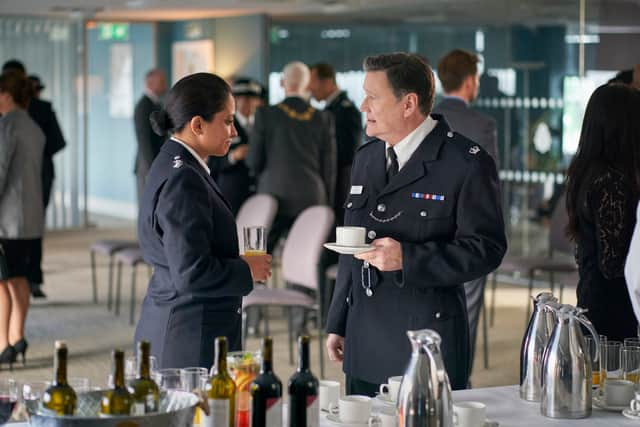

So, as you said there’s a lot of this that’s drawn from personal experience – did you find it easy to translate that into the police context?
Advertisement
Hide AdAdvertisement
Hide AdI think these microaggressions and these offhand comments, everyday assumptions and stereotypes, they are in every walk of life in every workplace. It’s such a universal theme that it just actually, you can easily slip into anywhere. I mean, that old question, where are you from? No. Where are you from from? I got pretty much every day in my 20s. Where are you from from? I mean, it’s like well, what’s wrong with Birmingham, that’s where I’m from! I think actually that was the easiest part, just putting these everyday things into here, because that’s just how humans are with each other.
There’s a lot of police drama made in the UK – when you’re starting to develop one, how does that impact the way you approach it? Are you quite conscious of needing to make them distinct?
I feel like you have to have a different take on it. What are we doing with this particular one? What is the point? What are we trying to say? Yes, of course, we have to have all the hooks and we have to keep audiences watching and we have to provide enough drama and twists – but what is it about this show that is different to the next one?
For me, it’s because it’s her show, and it’s her journey. We are so with her the whole time. She’s going through this identity crisis – it isn’t just simply about her doing her police work, it’s about her doing her police work with this big thing on her shoulders that she hasn’t quite dealt with yet.
Advertisement
Hide AdAdvertisement
Hide AdAnd also, we haven’t seen Birmingham! My hometown. We haven’t embraced Birmingham as a city to film in, to look at all of the wonderful locations of Birmingham and the Midlands. I wanted this to look and feel different – and also I want to set everything in Birmingham that I ever write, because I love it. We haven’t had a Brummie cop show! That was another part of it, the location.
Yeah, I thought that was interesting, because you get so much police drama that’s set somewhere… not generic exactly, but maybe anonymous? It’s not immediately apparent where it’s set in the same way that this is.
[It’s usually for] legal purposes. Obviously we’re not saying this is the real West Midlands police, we’ve made up our own fictional police force – if you’re setting something somewhere, and were being very, very, very specific, you could get into hot water with the real police that actually work there in that place.
Obviously that’s quite a fine line to tread – this is set in the West Midlands, but we’re not saying it’s that West Midlands police. It’s set in a fictional Birmingham, if you like! Which is really odd.
Advertisement
Hide AdAdvertisement
Hide AdOh, that’d never occurred to me actually – I’d always assumed it was about trying to make a show feel universal.
We have to get names checked, too – so if you can have characters’ names, one of the biggest checks we had was to make sure that there was nobody in the police force with the names used in the show. Because otherwise, that would be very awkward, it would look like we based it on them. So that was a big thing to check, and that’s why it’s called West Central Police.
I’ve learned something there!
Every day’s a school day! [laughs]
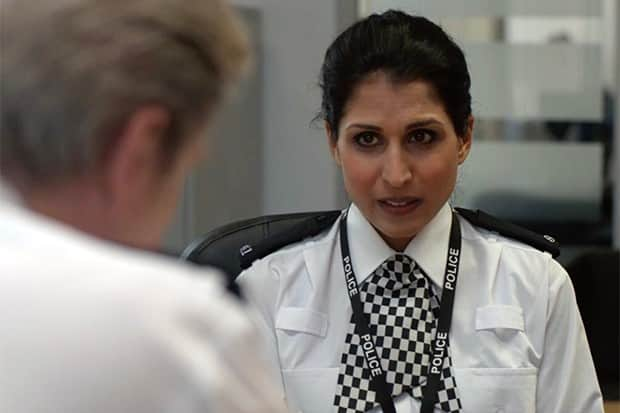

So, on another note, obviously you’ve worked quite closely with Jed Mercurio on this. Could you tell us a little bit about that?
Jed is brilliant at the plot and the twists and the stories. He’s a master of how to keep audiences watching. For me, that was the biggest learning curve, because I come much more from a place of character – I’m not always so great on the hook and trying to create the big drama moments. It was a really good combination, because he was so much across the scripting. We had a really brilliant script team, not just Jed but the other exec Madonna [Baptiste, producer of Black Mirror and Stephen amongst others].
Advertisement
Hide AdAdvertisement
Hide AdWe all were over the scripts, we talked about things that – I wrote them, but there was a collaborative process in terms of what we should do with certain plot points. Script editors were involved, associate producers, producers, the director, everyone has some input. I think that’s why it feels like, when you watch it, it’s an ensemble piece even though it’s about her: it was an ensemble piece behind the scenes as well. It’s lovely to say I created, wrote, and produced it all, but I actually did it with an amazing team of people as well. The crew as well – we shot it all in Birmingham, it was a lot of nights. It was just quite a tough shoot. People were brilliant.
What were some of your influences when it came to writing DI Ray, in terms of other television? I know you’ve said that [Issa Rae’s HBO comedy] Insecure was an inspiration, which I thought was an interesting touchstone for a police drama.
I love the way that Issa Rae just deals with normal relationships, and she deals with race in a way that’s so subtle and every day. It’s not about bashing you over the head with it, but she’s strong in her voice, in her writer’s voice, in how she feels about things. I feel like I want [DI Ray] to be that kind of casual with it.
I think also, I feel like I couldn’t tell you if [Insecure] was a comedy, or a comedy-drama, or a drama. I love that we mix up tones now, that we mix up genres. I, for example, love Succession. I think Succession can be incredibly dark, and absolutely hilarious and bonkers, and I love that mix. There’s so many shows that straddle lots of different genres. I personally love that. I watched the third episode of Chivalry last night, and I thought, “Wow, it’s gotten to a place where I didn’t think it would go. And it’s absolutely managed to do that. And maintain the lightness as well.”
Advertisement
Hide AdAdvertisement
Hide AdSo, for me, you can deal with really big themes and dark issues, but you can do it with a lightness of touch. I wanted Rachita to be funny – Midlands people are funny and dry, and take the piss out of ourselves before anyone else does. I wanted it to be funny, because I just didn’t want it to be bleak and grim. I hope you get that - Parminder is a brilliant comedy actress, she’s got very funny bones, and I think she delivered that really well, in a very subtle way. That was very important.
Almost on the flip side of that, is there anything – across television as a whole, you don’t need to be specific necessarily – that you’ve seen in other programmes, or experienced as an actor potentially, that you were almost reacting against here? “I’ve seen this, I want to avoid doing it in DI Ray for whatever reason”
Yeah. I did want to avoid anything with a white saviour type – there’s been other things where it’s been going into Asian communities, but then it’s always a white detective, a white lead, and they’re saving the day. Even films, you know, 12 Years A Slave, it has to be the white guy that saves the day at the end. I just didn’t want to do any of those things. I wanted a real mix of people, there’s no heroes, no savior – well, our heroine obviously, but I wanted to give Rachita her front and centre role.
She’s the heroine. It’s her show. She’s not a sideline character: she’s not the wife, the girlfriend, solicitor number three. This is her show. She’s a British Asian woman, at the heart of the show. To me, that is in itself so exciting, because I didn’t have that growing up. I was born in 83. I didn’t see that until I saw it Bend It Like Beckham, and then I didn’t really see it again. So I feel like we need more of this: we need more of this representation, in the middle, at the heart of the show.
Advertisement
Hide AdAdvertisement
Hide AdObviously, you’re an actor as well as a writer – how do you think that shapes your scripts? Are there things you’re maybe more conscious of as a result?
Yeah, I guess. Dialogue is something that… when I write, I often I get into a rhythm. I sometimes say it out loud, have conversations with myself – obviously, that’s hilarious for anyone else who has to walk past! [laughs] – and I feel like as an actor, you kind of understand when lines feel right, and when they when they just don’t feel like something anyone would say? That’s quite helpful. Although, saying that, there are writers who have never acted who write the most amazing dialogue! I’m not sure if it’s that. or I know when words just look like words, and not actual lines that people would say? When it’s just there to serve the script or the story, or when it’s actually things that people say, and the ways that people would react.
What I’ve also learned about is to trust. You can trust actors – when you’re an actor and you’re writing, you can trust that you can not say what a character is thinking, because the actor will play it. You don’t always have to say everything that everyone’s thinking, because they, if they’re good actors – which they are in this! – they will play it anyway. They will play that intention, and you can do so much with subtext. I think often you get writers who don’t act, or haven’t really been in the world long and are maybe a bit new, and they write everything that everyone’s thinking all the time. I kind of did a little bit of that at the start! But then you go, oh, no, we can trust it a bit more.
This is only vaguely related, but since you mentioned dialogue, I really liked that scene in the second episode where Rachita is in therapy.
Advertisement
Hide AdAdvertisement
Hide AdThat was – you probably know, you can probably tell – that was real. That was from my own experience. Although I say that, I thought I’d remembered it like that, or a version of that. I said to my dad, do you remember that time when you were in that market, because you’d forgotten your shoes, and we went to buy some cheap shoes, and that guy called you a p-word?
He went, “No, I don’t remember that. But to be fair, I did go out in my slippers a lot. And I did get called a p-word a lot. So it could’ve happened!” And I was like, oh my god, this is a big traumatic childhood memory for me, and you can’t even remember it! [laughs] And then now I think back about it, and I think: did the guy actually say something? Or did I imagine it, because I felt uncomfortable and embarrassed that my dad was wearing slippers in the market? And did I project that onto the looks that we were getting? It I imagine it? So now I’m not really sure.
But anyway, I’m glad you liked the scene! [laughs]
Is it… when you’re drawing on things like that, personal things like that, is it strange to think of that being released to the millions of people who are going to watch the show?
There’s two ways to look at it, and I’m thinking about this a lot. “Oh, my goodness, I’m totally exposing myself with this show. So many of these things have happened to me, and can people close to me – am I just basically putting my heart out there to be smashed?”
Advertisement
Hide AdAdvertisement
Hide AdAnd then I thought, actually, no one can criticize me for these things? Because I’ll be like, well, that actually happened. So, what can you say? I just wrote the truth. If you write the truth, you can’t be criticized for making something up, because it’s true. So I guess there’s those two ways of looking at it. I mean, by now I’ve got to the point where I’m just excited to see what other experiences people have had that are similar.
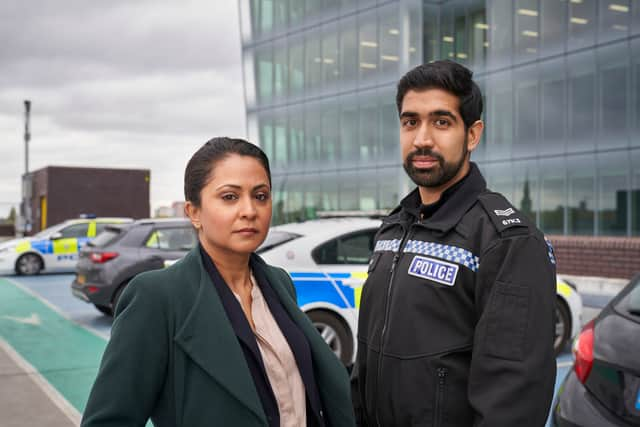

Is there anything you can tell us about what you’re working on next? Would you potentially be interested in doing another series of DI Ray, or is that top secret?
This one’s left open, so we’ll have to wait and see whether we do another one – whether people want another one! – and how everything works out. In terms of what I’m writing now, I can’t talk about that, because it’s not been announced yet, or officially greenlit. But it’ll be something for the BBC that’s totally different to DI Ray.
And then I’m going to do - this has been announced - I’m starting filming The Following Events are Based on a Pack of Lies for the BBC. It’s a new show, with an amazing cast, and I’m quite terrified, because it really is an amazing cast, so I need to be on it! I’ve not acted for a while on screen – I’ve done a lot of animation, cartoony type things – but it’s quite nice actually to have no responsibility again. I mean, I’m writing another script, but when I get the days where I’ll go and shoot, I can basically just do what I do as an actress and not think about anything else.
Advertisement
Hide AdAdvertisement
Hide AdYou know, as an executive on DI Ray, every day I was like having to watch dailies, look at casting tapes, rejig the script, take phone calls, emails, a million things. There was just always stuff to do. I was never off for that whole time throughout the shoot – well, before the shoot, through the shoot, and then after. Now as an actor, you get your lines, you get picked up, you learn your lines, somebody dresses you, somebody puts your makeup on, somebody takes you home! It’s like yay! Amazing, let’s do that for a bit! It’s very different, but I do like both sides of it. I do.
Finally, then, just to wrap everything up, what’s the main thing you’d want someone to take away from watching DI Ray?
I suppose… for people who experienced this kind of otherness, you’re not alone. A lot of people go through it on an everyday basis, and we need to work out the right way to deal with it so that we can feel comfortable. Then, for people who are on the other side of it, maybe just think, have I ever have I ever dealt with someone in a kind of an offhand, casual way that might have been quite offensive to them? Or something inappropriate, which actually looking back maybe I shouldn’t have? Or have I assumed things about someone, just from the colour of their skin maybe?
I guess… I’m not telling anyone how to think, and I don’t have any answers either, unfortunately. But we’ve got to just have a bit more of an open dialogue about race and identity, feeling comfortable with it. You know, the phrase that I hate the most at the moment is “you can’t say anything these days.” That’s not good enough, because that makes people feel like they can’t speak out when they’re feeling uncomfortable. That’s not okay. So, we need to get rid of that whole movement these days. Obviously, we can’t go too far the other way, when you can’t even say anything – but we do need to find a happy medium, I think.
DI Ray begins on ITV on Monday 2 May at 9pm, with new episodes airing nightly through the week until Thursday. You can read NationalWorld’s enthusiastic review of DI Ray writer right here.
Comment Guidelines
National World encourages reader discussion on our stories. User feedback, insights and back-and-forth exchanges add a rich layer of context to reporting. Please review our Community Guidelines before commenting.
